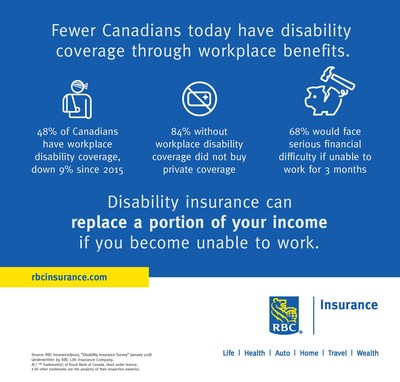Fewer Canadians have disability coverage through workplace benefits, leaving them more at risk
Twitter: The number of Canadians with disability insurance through workplace benefits is on the decline, leaving them more at risk @RBCInsurance
Summary: The number of Canadians with disability coverage through workplace benefits has fallen significantly since 2015 – 48% vs 57%. Of those Canadians without disability coverage through their workplace, 84% have not bought coverage themselves. Yet, if faced with the possibility of becoming disabled and unable to work for three months, 68% admit they would face serious financial trouble. However, when it comes to accessing disability coverage, where and how Canadians find work are strong barriers, along with affordability.
TORONTO, April 24, 2018 /CNW/ - The number of Canadians with disability coverage through workplace benefits has declined significantly since 2015, according to a recent RBC Insurance survey. Fewer than half (48 per cent) of employed Canadians say they have disability coverage through their workplace benefits, compared to 57 per cent in 20151. Of those without disability coverage through their workplace, 84 per cent have not bought coverage themselves, leaving them at financial risk if unable to work due to a disability.

"With the majority of employed Canadians indicating that they do not have disability insurance through their workplace benefits package, workers need to review what coverage they do have and take immediate steps to ensure that they are well protected in case something were to happen," explains Maria Winslow, Senior Director, Life & Health, RBC Insurance. "Without the proper financial protection in place, Canadians are putting themselves and their families at risk if they are faced with a disability and have to take time off work."
Being off work takes a financial toll that many people are not prepared to handle. A majority (68 per cent) of working Canadians acknowledge the possibility of serious financial implications for them and their family if they were to become disabled and unable to work for three months. In fact, when faced with a disability, 45 per cent of working Canadians would have liked to take time off due to disability but could not because of finances, and 51 per cent said they were forced to go back to work earlier than they wanted because of their financial situation.
"When confronted with a disability, the last thing that should be on your mind is worrying about finances. Purchasing individual disability coverage provides you with the security of knowing you will have money coming in to replace your lost income," says Winslow.
Barriers to Accessing Disability Coverage
Increasingly, where and how Canadians find work are strong barriers to accessing disability insurance coverage. Those without coverage say:
- Their workplace doesn't offer group benefits or disability insurance (35 per cent)
- They work part-time or on contract and aren't eligible for benefits (25 per cent)
- They're self-employed or freelance (22 per cent)
Cost is another key barrier – one in four (26 per cent) working Canadians without disability coverage feel they cannot afford it.
"There's a misconception that disability insurance is expensive, yet it's much less than you might think - generally costing between one and three per cent of your income," adds Winslow.
Here are a few things Canadians should consider:
- The best time to buy disability insurance is before an injury or illness occurs.
- Don't choose a policy on price alone. Be aware that the prices are aligned with the features and benefits of the policy. Make sure you know the policy's definition of disability, as the definition may vary among carriers.
- Review the coverage available through your employer and consider whether you need additional coverage to fill in the gaps.
- Disability insurance is essentially an income replacement policy; it is designed to cover a portion of your income should you become unable to work.
About the RBC Insurance Survey
These are some of the findings of an Ipsos poll conducted between January 2nd and January 4th, 2018 on behalf of RBC Insurance. For this survey, a sample of 1,505 employed Canadians aged 18+ was interviewed. Weighting was then employed to balance demographics to ensure that the sample's composition reflects that of the adult population according to Census data and to provide results intended to approximate the sample universe. The precision of Ipsos online polls is measured using a credibility interval. In this case, the results are considered accurate to within ±3.0 percentage points, 19 times out of 20, had all working Canadian adults been polled. The credibility interval will be wider among subsets of the population. All sample surveys and polls may be subject to other sources of error, including, but not limited to coverage error, and measurement error.
About RBC Insurance
RBC Insurance® offers a wide range of life, health, home, auto, travel, wealth and reinsurance advice and solutions, as well as creditor and business insurance services to individual, business and group clients. RBC Insurance is the brand name for the insurance operating entities of Royal Bank of Canada, one of North America's leading diversified financial services companies. RBC Insurance is among the largest Canadian bank-owned insurance organizations, with approximately 2,500 employees who serve more than four million clients globally. For more information, please visit rbcinsurance.com.
___________________________
1 2015 RBC Insurance survey
SOURCE RBC Insurance
